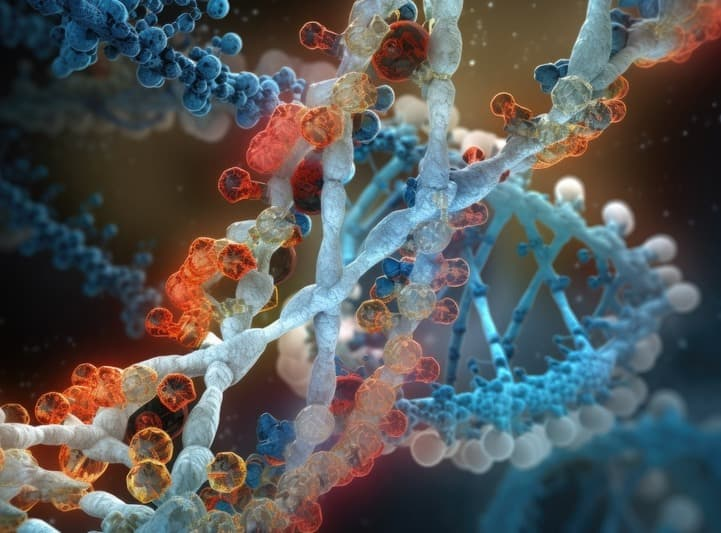
The exact causes of ADHD are still not fully understood. However, current research suggests that a combination of genetic and environmental factors influences brain development. As a result, certain brain circuits may function differently, which is closely linked to the symptoms of ADHD.
One important area involves the brain’s messenger system, called neurotransmitters, which allows nerve cells to communicate with each other. In people with ADHD, differences have been observed in this system—especially with dopamine and noradrenaline. Since these messengers are essential for attention and self-control, any imbalance can have a significant impact on daily functioning.
At the same time, ADHD does not develop in the same way in every person. This means that not all individuals show the same brain changes or face the same challenges. In addition, many of the brain differences found in ADHD are not unique to this condition—they can also appear in other disorders.
Because of these changes in brain function and metabolism, people with ADHD often have difficulty sustaining focus, controlling impulses, and making full use of their abilities. Consequently, they may find it harder to stay organized, plan ahead, and act in a thoughtful, goal-oriented way.
For ADHD Therapy Schedule an Appointment with Our Psychiatrist, Dr. Kowal
Call CHMCGenetic Factors Causing ADHD

Genes are often described as the “blueprints” of who we are. Strong evidence suggests that genetics play a major role in the causes of ADHD. Family, twin, and adoption studies consistently show that ADHD tends to run in families. For example, identical twins share ADHD symptoms about 80% of the time, while fraternal twins share them in roughly 30% of cases.
Molecular genetic studies have also identified specific regions of DNA that are linked to ADHD. These include genes involved in producing and regulating dopamine, a key neurotransmitter that influences attention, reward, and motivation. Children with ADHD often show thinner brain tissue in the prefrontal cortex, the part of the brain responsible for focus and planning.
Recent international studies, including research on ADHD in Dubai and Germany, have deepened our understanding of how genetic differences affect brain development. However, while genes strongly increase the risk, they are not the only causes of ADHD.
Environmental Factors and Genetics
Although genetics provide the foundation, environmental factors can influence how ADHD develops. In fact, most experts believe that ADHD arises from the interaction of multiple genes with environmental conditions.
For example, complications during pregnancy or birth, premature delivery, or a lack of oxygen at birth may increase the likelihood of ADHD. Similarly, exposure to toxins such as lead, smoking, or alcohol during pregnancy can raise the risk.
Lifestyle factors also play a role. Studies show that infants and toddlers who spend more than two hours per day in front of screens (TV, mobiles, or video games) have a higher chance of developing attentional problems. By contrast, activities that encourage patience and concentration—such as reading, family meals, board games, or sports—can help strengthen attention skills.
Brain Abnormalities as a Cause of ADHD

Brain imaging studies have revealed important insights into the neurological causes of ADHD. Research shows that differences in brain structure and function are common in people with the disorder.
EEG, MRI, and PET-scan studies have found abnormalities in areas such as the striatum, frontal lobe, cerebellum, and prefrontal cortex. These regions regulate motivation, planning, movement, and emotional control. Reduced activity or smaller volume in these circuits can result in difficulties managing attention and self-control.
Furthermore, studies suggest that imbalances in neurotransmitters—particularly dopamine and noradrenaline—contribute to ADHD symptoms. These findings highlight that ADHD is not simply a behavioral problem but a condition rooted in measurable brain differences.
Pregnancy, Birth Complications, and Stress
Certain conditions during pregnancy and birth are considered additional causes of ADHD. For instance, maternal smoking, alcohol consumption, drug use, infections, or lack of oxygen at birth can increase the risk. Stress and poor maternal health during pregnancy may also play a role.
That said, not all children exposed to these risks develop ADHD. Many children with the disorder have had healthy pregnancies and deliveries. Therefore, while complications may contribute, they are not the sole cause.
Early Childhood Trauma and ADHD
Emotional and relational experiences in early life can also influence the development of ADHD. Studies suggest that children who suffer from neglect, emotional detachment from caregivers, or abuse may develop attentional and self-regulatory difficulties similar to ADHD. These adverse experiences affect brain development, especially the systems responsible for attention and impulse control.
Psychosocial Influences on ADHD
Family and social environments do not directly cause ADHD, but they can shape how symptoms develop and how severe they become. For example, children living in households with frequent conflict, inconsistent parenting, or parental mental illness may experience more pronounced difficulties.
Risk factors include:
- Growing up in single-parent households without stability
- Parental mental health problems, especially antisocial traits in fathers
- Chronic family stress or financial difficulties
- Overcrowded living conditions
- Inconsistent rules and frequent punishment
These psychosocial elements do not create ADHD on their own but can interact with genetic predispositions to make symptoms worse.
Evolutionary Theories of ADHD
Some researchers view ADHD through the lens of evolution. The “hunter versus farmer” theory suggests that ADHD traits may once have been advantageous. In early human societies, individuals with hyperactivity and quick responsiveness may have been better hunters and explorers.
Supporting this idea, genetic studies show that the DRD4 gene variant linked to ADHD is more common in nomadic populations. In such groups, this trait may have provided survival benefits, such as higher energy, alertness, and adaptability. While these traits may be less adaptive in today’s structured environments, they reflect an evolutionary background rather than a simple “disorder.”
Summary: ADHD a Multifactorial Condition
The causes of ADHD are complex and involve an interplay of genetics, brain function, environment, and social factors. No single cause explains all cases. Instead, ADHD arises from a combination of influences that together shape how the brain develops and functions.
Understanding these causes not only helps reduce stigma but also guides better treatment strategies. With proper diagnosis and support, individuals with ADHD can learn to manage symptoms and use their strengths effectively.
If you’re concerned about your mental health condition, feel free to contact us on WhatsApp


